What Is a Gunite Pool? See if It Is Better Than Concrete
-
Greg Iacono
- Last updated:
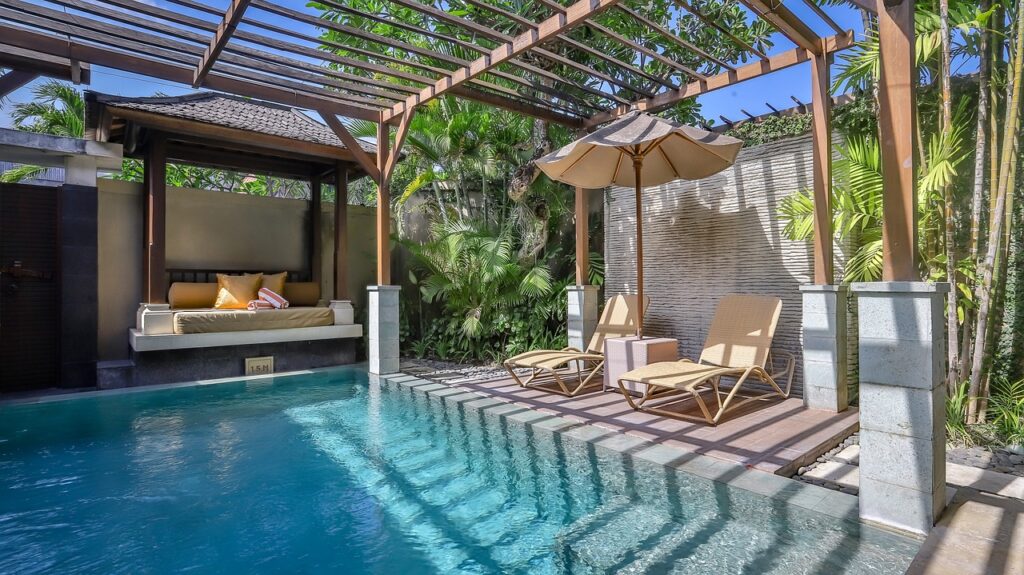
Having a pool in your backyard is the dream for many homeowners. Few things are more enjoyable than spending a sunny afternoon with family and friends in your private pool. If you’re planning to put a pool in your backyard, the first choice you need to make is what type of material to use.
You may know three of them: concrete, vinyl, and fiberglass. Since the 1940s, there’s also been a 4th choice, which is a material called gunite. Gunite offers several benefits over concrete, but, like any construction material, it has a few drawbacks. Read on to discover how gunite is made, where it’s used, and its advantages and disadvantages over concrete.

How Does It Work?
Before we get into the details of how gunite works, gunite and concrete are very similar and made from basically the same substances: cement, sand, and aggregate. Both gunite and concrete use rebar to give their pools improved strength and flexibility.
However, while concrete is poured into the mold, gunite is sprayed using a high-powered, unique spraying device. Another difference is that concrete contains large and small aggregates like rocks, pebbles, and crushed stones, but gunite’s aggregate is much finer. That gives it a smoother surface once cured.
The Application Process is Vastly Different
Gunite application experts use a high-pressure tool that pushes the dry gunite mix through a tube. At the end of the tube, there is a specialized nozzle where the dry gunite is mixed with water just before spraying. Then, that nozzle shoots the gunite onto the surface of the pool’s form.
Gunite is Sprayed in Thin Layers
Another significant difference between making a pool with concrete and one with gunite is that gunite is sprayed in several thin layers. Once one layer dries, another layer is sprayed on top until the correct thickness is achieved. Concrete, on the other hand, is poured into a mold and reaches its designated thickness immediately.

The Application Process Must Be Precise
Interestingly, the dry gunite mix and water are combined at the very last moment and must be mixed precisely. If not, the resultant gunite will either be too dry or too wet, neither of which will adhere correctly to the surface of the pool’s structure.
To do it right, one person on the pool installation team is usually the “nozzle operator,” with the experience and expertise to precisely control the flow of dry gunite mix and water. An experienced nozzle handler can make a big difference in the quality of the finished pool.
Less Heavy Equipment Is Needed to Make a Gunite Pool
One of the main reasons gunite pools are so popular is that construction companies can build customized pools in suburban backyards without the need for much heavy equipment. Also, there’s no need to create concrete molds. Instead, you can create a shape in the ground using well-compacted earth and then spray the gunite directly over it.
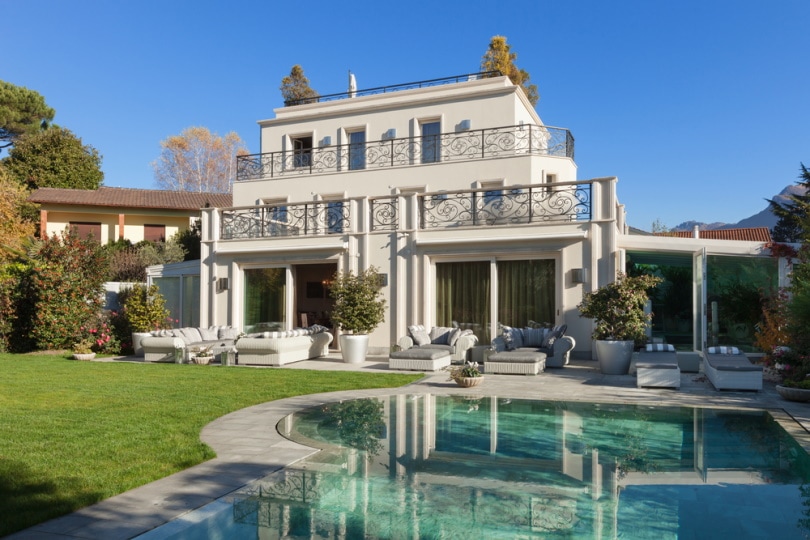

What Are the Different Types of Gunite Pool Finishes?
Regardless of the size or shape, all gunite pools are constructed similarly. The only difference is the finish you choose for your gunite pool. Four finishes are typically used on gunite, including aggregate, quartz, glass beads, and tile.
1. Aggregate
You might recognize the term “aggregate” as it’s one of the three main ingredients used to make concrete and gunite. The aggregate used as a finish in gunite pools is similar but slightly different and is made up of small, smooth rocks and pebbles. When finished, it gives a very natural look to a pool, similar to what you might find in a pond or stream.
2. Quartz
A quartz finish on your gunite pool is by far the most expensive but also the most strikingly beautiful, with a feel that’s out of this world. Quartz is smooth as silk and reflects sunlight. Quartz on the bottom of your pool makes it look amazing, as the entire floor will be reflective. In other words, your gunite pool will look incredible when the sun shines if it has a quartz finish!
3. Glass Beads
Glass beads are relatively new to the gunite pool party. The big plus of glass beads is that they give your pool a seamless look and are very classy. You can also get glass beads in various colors, which opens your palette to more possibilities. Lastly, even though they’re glass, glass beads are incredibly durable and long-lasting.
4. Tile
Tile has been a popular gunite finish for decades because it can be laid in many beautiful patterns. However, it takes much longer than the other three finishes. One big plus is that tile incredibly durable and will handle years of wear and tear while still looking like it was laid last week.
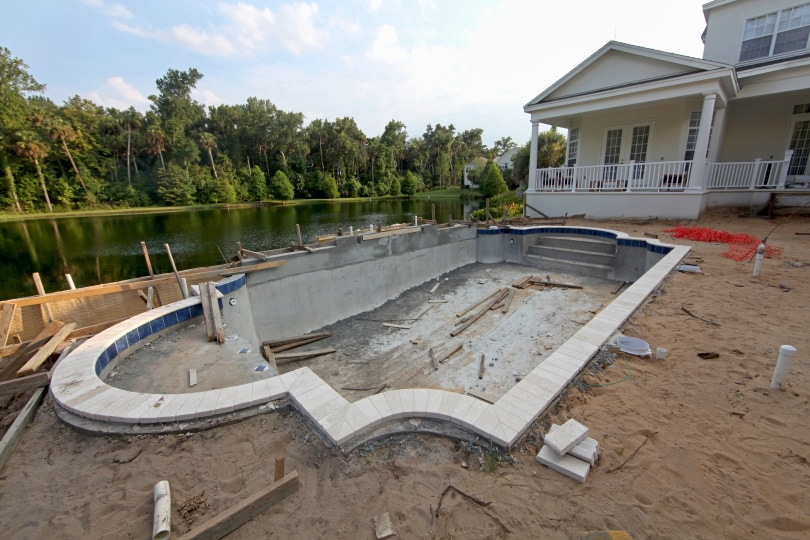

Where Is It Used?
Gunite is used worldwide, especially in the United States, to make custom pools of all shapes, sizes, and depths. What’s truly unique is that gunite is also used in various other projects. That includes tunnels, train stations, domes, water tanks, dams, retention walls, channels, and even bridges!
Advantages of Gunite Pools
Gunite has several distinct advantages when used to construct a swimming pool.
Durability
Gunite is a durable, stable material that can be replastered if needed and will stay in excellent shape for an exceptionally long time.
Gunite is Porous
Gunite is a porous material that absorbs and holds water, improving its stability.
Versatility
You can use gunite to make almost any shape of pool you can dream up. Gunite can also be used if, for example, you want a deep pool, an extra-large pool, or a pool with lounging and tanning areas.
Customizable
You can customize gunite to fit any need or finish, including tile, stone, and various textures. Waterfalls can be built into gunite pools as well as slides, fancy steps, grottos, and more.
Gunite Has No Seams
Because gunite is sprayed on rather than poured into a mold, a gunite swimming pool will have no seams like a concrete pool. A seamless pool is more aesthetically pleasing to the eye.

Disadvantages of Gunite Pools
Although gunite has many excellent properties, it has several disadvantages you should know about before choosing it as your pool material.
They Cost More to Construct
Gunite pools cost about 30% more to construct, a factor that will potentially affect your decision based on the budget you set for the project.
It’s More Difficult to Maintain
Because gunite is so porous, algae can gain a foothold and proliferate on its surface. Even worse, if algae embed on the surface, it’s incredibly difficult to clean off.
You’ll Need More Chemicals
Keeping algae from becoming a problem in a gunite pool means using more algae-killing chemicals. This need for more chemicals increases your cost and maintenance time and exposes you and your family to more chemicals.
The Installation Time Is Longer
One problem with a gunite pool is that it can take two to four months to complete. That’s quite a bit longer than, for example, a fiberglass or vinyl pool. However, it’s about equal to the time it takes to build a concrete pool.
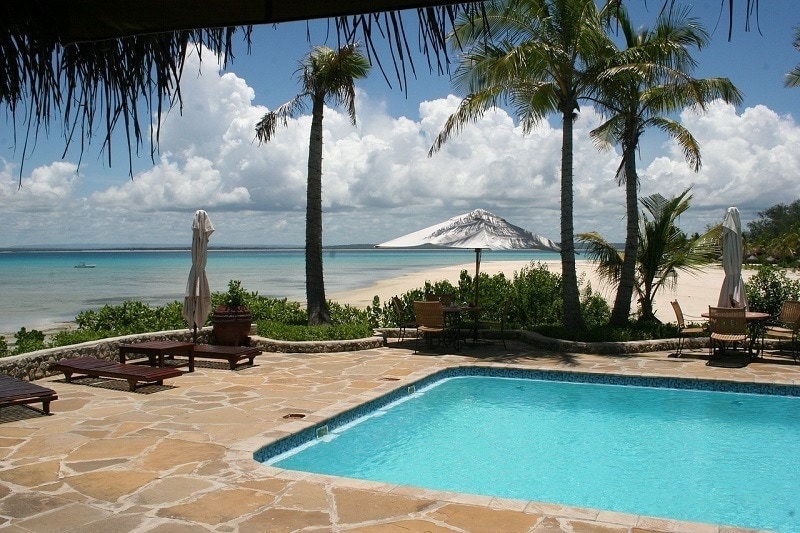

Frequently Asked Questions (FAQs)
Below are the most frequently asked questions about gunite pools and how they’re made.
Are gunite and concrete the same thing?
Yes, except for the aggregate, which is smaller in gunite.
How long will a well-built gunite pool last?
If the gunite is sprayed on correctly, a gunite pool can last upwards of 100 years and even longer.
What is the difference between gunite and shotcrete?
Gunite mix is dry applied while shotcrete is applied wet. Also, shotcrete has a minimum strength of 6,000 psi, while gunite is considerably lower at 2,500 psi.
How long does it take to build a gunite pool?
Between 3 to 4 months depending on the weather, size of the pool, and several other factors.
How often do gunite pools need to be maintained during summer?
You must service your gunite pool once a week. That includes adding chemicals, removing algae, emptying baskets, and, if needed, adding water.
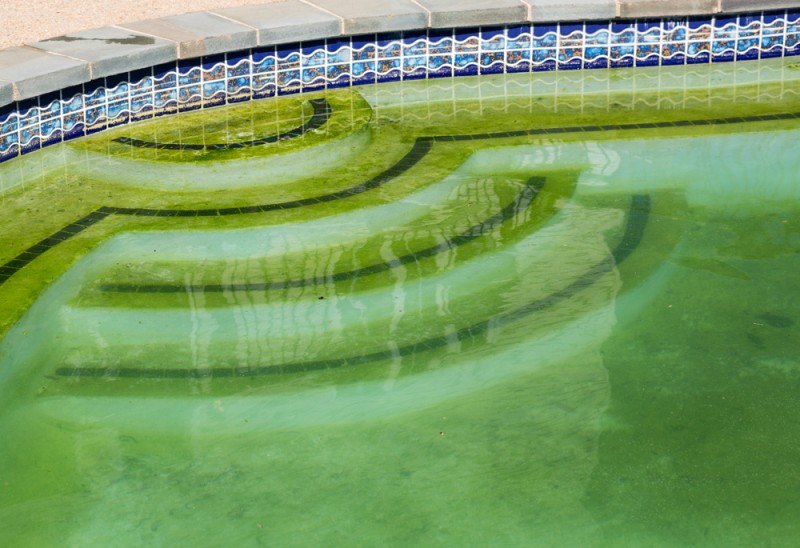
Do you need to empty a gunite pool after every season?
No, emptying your gunite pool won’t be necessary. It is recommended, however, that you lower the water until it sits just below the return inlets. This depth is typically between 20 inches and 24 inches.
Is it necessary to brush gunite to keep it clean?
Experts recommend brushing your gunite pool regularly to prevent stains and algae from getting a foothold.
How often does gunite need to be replastered?
Experts recommend replastering a gunite pool every 10 years, although this can change based on where you live, the climate in your part of the world, and other factors.
Can you have saltwater in a gunite pool?
A saltwater pool with a saltwater chlorinator is no problem for a gunite pool. However, many people report that their pools became lightly stained over several years due to the salt.
Can a gunite pool be left empty?
Leaving a gunite pool empty is not recommended. The reason is that if it rains and the groundwater around your yard increases dramatically, it can lift the gunite pool up and out of place.
Do gunite pools need to be sealed?
Sealing a gunite pool is one of the most critical steps in the construction process and vital to the success of your pool project.
What happens if my gunite pool overflows?
A gunite pool won’t suffer any damage if it overflows, although its skimmer won’t be as effective.
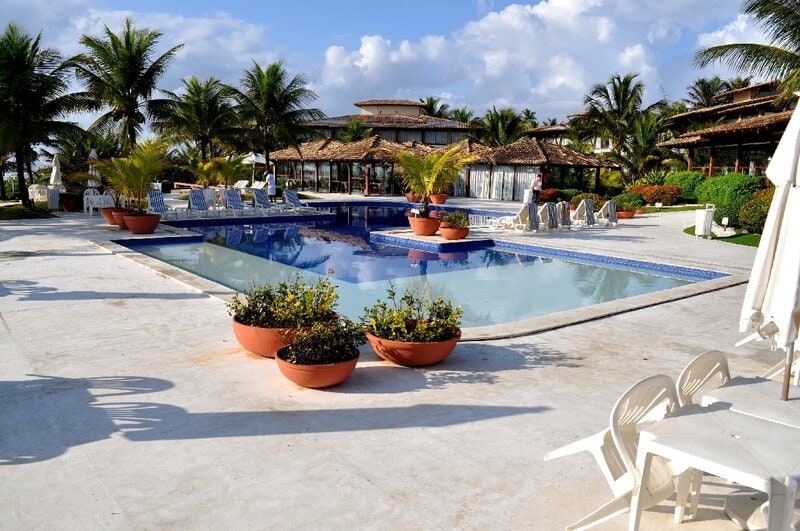
Can you pressure wash a gunite pool?
Yes, pressure washing a gunite pool is not a problem once it has been completely cured and finished.
Will algae stain a gunite pool?
Unfortunately, algae can stain a gunite pool and leave behind difficult-to-remove stains. Regular cleaning and the correct anti-algae chemicals are recommended to prevent this.

A Quick Reference Guide
| Gunite | Concrete | |
| Average Cost | $55,000 to $120,000 | $70,000 to $80,000 |
| Construction Time | 3 to 5 months | 2 to 3 months |
| Construction Method | Sprayed into place | Poured into a mold |
| Rebar Used? | Yes | Yes |
| Average Lifespan | 100+ years | 50+ years |
| Average Monthly Maintenance Cost | $80 to $150 per month | $80 to $150 per month |
| Customizable? | Yes | Yes |

Final Thoughts
Gunite has been used to make pools since the 1940s and is one of the most popular materials used to make swimming pools in the United States. Gunite is durable, attractive, customizable, and easier to install, although it is more expensive than concrete.
Gunite is concrete; it’s just applied differently and has a finer aggregate. If you’re in the market for a backyard pool, a gunite pool should be on your list of choices. They look amazing, last a very long time, and will significantly increase the value of your home. Whatever you decide, best of luck and many happy memories in your new gunite pool!
Featured Image Credit: innokurnia, Pixabay
Contents
